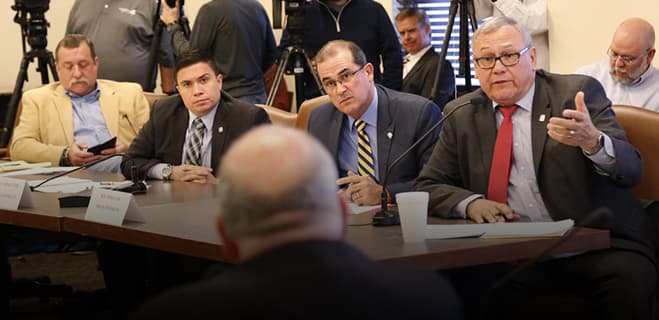
Budget & Tax , Health Care
Trent England | May 30, 2018
Shadow government spending
Trent England
This article was published in OCPA's Perspective magazine View Issue
The Oklahoma State Department of Health (OSDH) offers a radical example of dishonesty. But it is hardly unique among state agencies. Oklahoma’s entire state budget process is misleading. This is because so much of what agencies spend flows around, rather than through, the state budget.
According to data from OpenTheBooks.com, OSDH received federal grants and contracts. The Department also receives fee and property tax revenues, which likewise bypass the annual budget process. The Legislature relied on OSDH to report on these other revenue streams. The state’s finance agency relied on OSDH to properly manage the funds.
In fact, OSDH lied about how much money came in, and how much went out, for years. Top officials created a secret “slush fund” that they controlled. They thought all this was okay, it seems, because they weren’t stealing the money. They were just running the agency their own way, outside the bounds of law or democratic accountability.
If you think this kind of money flow is unusual, think again. The Oklahoma State Bureau of Investigation gets federal funds through both contracts and grants. The Oklahoma Department of Environmental Quality does too. Both also have streams of fee revenues. Oklahoma’s Department of Education receives federal contracts, direct payments and grants, and like OSDH also receives local property taxes.
Over the weekend, The Oklahoman pointed out one result of all this.
Claims of draconian cuts in state government often focus only on agency funds directly appropriated by the Legislature. Yet that funding accounts for only a share of total government spending. In addition to appropriations, there's state funding that doesn't go through the legislative appropriation process, along with fee revenue, federal funds, and local tax funding used by the state.
As a result, agencies receiving less in state appropriations can still see their overall budgets increase. The Health Department is not the only agency where that can occur. That's why, despite claims of enormous spending reductions, the overall trajectory of Oklahoma government spending has continued to climb.
This is exactly the point OCPA made last year in a series of “Bogus Budget” blog posts and a fact check of Gov. Mary Fallin’s budget cuts chart.
It’s like a teenage boy who tells dad he needs $20 to go out with friends. Dad, feeling generous, pulls an Andrew Jackson out of his wallet, but then mom walks in. “I just gave him $10,” she says.
“Well then, I’m only giving you $10,” says dad to his son. “But dad,” sonny retorts, “you just cut my appropriation in half!”
What matters is not how much money came from a particular source, but how much—in total—might be necessary, and how much is being spent.
One reform seems likely to result from the OSDH debacle: putting all agency funds through the state’s standard accounting software. That would make it harder for an agency to have a secret slush fund or to lie about financial numbers. But honest numbers are just one part of running a state agency with integrity. What is needed is accountability for all the dollars being spent.
The next Governor and Legislature should rebuild the state budget process to account for all funds. This does not mean dumping every dollar into the state’s general fund. It does mean building a budget based on every dollar agencies receive—state taxes and fees, local taxes, federal grants, other federal funds, tuition dollars … everything.
This would have two immediate consequences. One would be a more honest conversation, where everyone starts with the same set of numbers. (Getting the facts straight before arguing with each other might even decrease the level of acrimony.) The other would be greater accountability for agencies, with fewer opportunities to hide mismanagement or waste.
Another reform would require agencies to report annually on federal funding. How much did the agency receive? What did it commit to do with that money? What did it commit to do with other money, or not to do, as a condition? This is basic information that the Governor and Legislature need to build a budget and oversee agencies, and that the people of Oklahoma deserve to have access to. In 2015, Gov. Mary Fallin vetoed a bill to provide such transparency.
The Health Department is not unique. Beneficiaries of the status quo are quick to cast the scandal-ridden agency as a one-off, an outlier. But some of the conditions that made possible years of lying about OSDH finances exist across Oklahoma government. These can be addressed by creating a more honest budget process and bringing greater transparency to federal funding.

Trent England
David and Ann Brown Distinguished Fellow
Trent England is the David and Ann Brown Distinguished Fellow at the Oklahoma Council of Public Affairs, where he previously served as executive vice president. He is also the founder and executive director of Save Our States, which educates Americans about the importance of the Electoral College. England is a producer of the feature-length documentary “Safeguard: An Electoral College Story.” He has appeared three times on Fox & Friends and is a frequent guest on media programs from coast to coast. He is the author of Why We Must Defend the Electoral College and a contributor to The Heritage Guide to the Constitution and One Nation Under Arrest: How Crazy Laws, Rogue Prosecutors, and Activist Judges Threaten Your Liberty. His writing has also appeared in the Wall Street Journal, USA Today, Washington Times, Hillsdale College's Imprimis speech digest, and other publications. Trent formerly hosted morning drive-time radio in Oklahoma City and has filled for various radio hosts including Ben Shapiro. A former legal policy analyst at The Heritage Foundation, he holds a law degree from The George Mason University School of Law and a bachelor of arts in government from Claremont McKenna College.